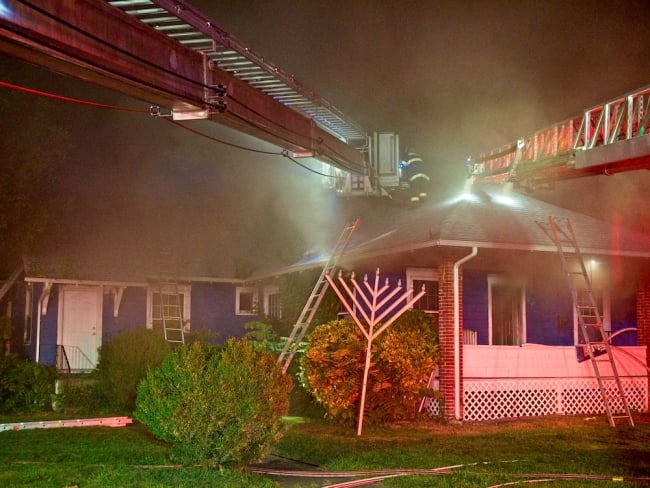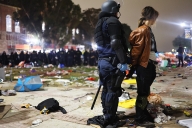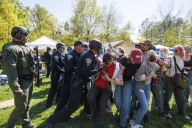You have /5 articles left.
Sign up for a free account or log in.

Firefighters work to put out a blaze on Aug. 25 at the University of Delaware Chabad Center.
Michael Romagnoli
For Jewish students at the University of Delaware, the fall semester was preceded by heightened anxiety and worries about returning to campus. Not because of the coronavirus pandemic, but because two weeks ago an arsonist set fire to the university’s Chabad Center, which many students considered a “home away from home” and a safe space to celebrate their Jewish identity and culture.
Talia Feldman, a senior and student leader in the university’s Hillel and Chabad organizations, said she was “shocked and confused” to learn on the morning of Aug. 26 that the center had been destroyed by fire overnight. Feldman said she thought about the hundreds of hours she had spent hanging out, attending meetings and having meals or Shabbat dinner every Friday evening in the small blue house in Newark.
“I definitely have a lot of memories in that house, and it’s really crazy for me that it’s gone,” she said.
While both Hillel and Chabad have centers on campuses across the country, Chabad is based around more traditional religious and cultural aspects of Judaism, while Hillel is more of a social organization for Jewish students that also incorporates religion and culture.
Officials said the fire at the Chabad Center at Delaware caused an estimated $200,000 in damage but that “there is currently no indication” it was a hate crime, according to a press release from the Bureau of Alcohol, Tobacco, Firearms and Explosives' Baltimore Field Division, which is investigating the incident. Donna Schwartz, executive director of UD Hillel, said whether or not the fire is “officially” determined to be an act of anti-Semitism, it feels like one to the Jewish community.
“No matter what, it feels like a hate crime, and that’s a problem,” Schwartz said. “It’s a Jewish organization. There are thousands upon thousands of houses in Newark. Why that house?”
The fire and verbal and online harassment targeting Jewish students over the past month are part of a larger trend of rising anti-Semitic incidents at higher ed institutions, Jewish college community leaders say. Hillel, an international Jewish student organization, recently reported that anti-Semitic incidents reached an all-time high of 178 during the 2019-20 academic year at the 550 colleges and universities in North America the organization serves. Anti-Semitism on college campuses has been rising significantly since 2016, according to the Anti-Defamation League.
“There’s more of a heightened anxiety on campus and around the country. It’s not specific to our campus,” Schwartz said. “You’re seeing it on the news, in tweets and social media posts, and it’s hard not to continuously think about that. College campuses are just sort of a great breeding ground for it.”
Schwartz said in an email that Jewish people are also on "high alert" for anti-Semitic acts around significant Jewish holidays, two of which are later this month and typically occur near the start of the academic year. Rosh Hashana, the Jewish New Year, is on Sept. 19 and 20, and Yom Kippur, a day of atonement, is on Sept. 28.
Mark Rotenberg, Hillel International's vice president of university initiatives and legal affairs and a law professor at American University, said the rise in anti-Semitic attacks on Jewish students, including many incidents of online harassment, have come from both “far right and far left ideological orientations,” such as white supremacists and those who accuse pro-Israel students of being “Zionist racists.”
There is a distinct difference between free speech criticizing Israel’s relations with nations in the Middle East or Israeli policies that affect Palestinian people and personal attacks on students for their support of Israel or Jewish identity, said Rotenberg, who is also former general counsel for the University of Minnesota and Johns Hopkins University.
“No one is suggesting that universities should in any respect suppress the values of academic freedom and free speech, but singling out individual students and groups of students for attack is an entirely different matter,” Rotenberg said. “That’s the line that separates robust, critical engagement on policy questions from unacceptable and unlawful targeting of individual students.”
In one such incident in early August, Rose Ritch, former vice president of the Undergraduate Student Government at the University of Southern California, felt she was forced to step down from her position after she was “harassed and pressured” by students who called her a racist for her support of Israel and launched a campaign to impeach her, a letter by Ritch posted on Facebook said. These students felt her support for Israel made her “unsuitable” to be a student leader, and the rhetoric they used played into “the oldest stereotypes of Jews, including accusations of having dual loyalty to the United States and Israel and holding all Jews responsible for the actions of the Israeli government,” she wrote.
“The sad reality is that my story is not uncommon on college campuses,” Ritch wrote in the letter. “Across the country, Zionist students are being asked to disavow their identities or beliefs to enter many spaces on their campuses. My Zionism should not and cannot disqualify me from being a leader on campus, nor should others presume what that means about my position on social justice issues.”
USC president Carol Folt called the incident “unacceptable” in a Aug. 6 message to students, staff and faculty members and wrote that “it is critically important to state explicitly and unequivocally that anti-Semitism in all of its forms is a profound betrayal of our principles and has no place at the university.” Forty-three faculty members condemned the incident in a letter to the USC community on Aug. 30. The faculty members reject “in the strongest possible terms any and all attempts to associate Zionism with such inflammatory accusations as racism, colonialism, and white supremacy, which are diametrically antithetical to Zionist ideas and aims,” the letter said.
Folt said in her message that USC still grapples with a history of anti-Semitism and announced the university had launched a new initiative, Stronger Than Hate, to address biases against marginalized students through educational programming and conversations about culture and identity.
“Over the last several years, incidents of anti-Semitism in American higher education have dramatically increased, and anti-Semitic attacks remain the most common religiously motivated hate crime in the United States,” Folt wrote. “As a result, this has been an extremely painful period for our Jewish community … It is more important now than ever for our university to serve as a global beacon of belonging.”
Rotenberg said far too often, university administrators do not call out anti-Semitism for what it is and do not take steps to prevent incidents from occurring, such as providing education programs that help students and staff members understand how anti-Semitism “manifests on their campuses in 2020.” Jewish students are “fed up” with being marginalized and want college administrators to call it out when it occurs rather than put out “plain vanilla statements” about overall commitments to diversity and inclusion.
Danny Goldberg, who is Jewish and a second-year law student at Arizona State University in Tempe, Ariz., is advocating for university leadership and others on campus to speak up about anti-Semitism after posters praising Hitler were discovered on campus on Aug. 30 for the second consecutive year. The posters were immediately removed and campus police were made aware of the incident and are investigating, a university statement issued Aug. 31 said.
"ASU is a community that values diversity, tolerance, respect and inclusion," the statement said. "We support open debate and honest disagreements and we reject and will not accept antisemitism or hateful rhetoric of any kind."
Michael Crow, the university's president, also spoke about the posters during a student forum on Sept. 3, calling them anti-Semitic.
Goldberg is glad administrators spoke out and were unequivocal. He said anti-Semitism can become acceptable on campuses if incidents are not clearly and vocally condemned. Doing so is especially important to help non-Jewish students, who may not as easily identify certain language or acts as being anti-Semitic, understand the hurt and impact of such actions, he said.
“Right now, words really do matter, and we have to call out anti-Semitism whenever and wherever it shows up,” he said. “We have to speak up no matter how small the incident is … It’s important to use the word ‘anti-Semitism,’ because if not, it’s only normalizing the behavior.”
Hillel recently launched the Campus Climate Initiative, a pilot program for university leaders to learn how to best address and prevent anti-Semitic incidents on campus. The program will partner with administrators and higher education organizations, such as the American Council on Education, said Rotenberg, who is leading the initiative. Among the goals is to have condemnation of anti-Semitism explicitly incorporated into existing mission statements, values and structures for antiracism, inclusion and equity, he said.
Proposed improvements of campus climate will vary from campus to campus based on their current climate, but some examples could include implementing better reporting structures for bias incidents against Jewish or pro-Israel students to ensure colleges are tracking them properly, Rotenberg said. The initiative will also aim to inform student affairs officials on where to draw lines between freedom of speech and direct anti-Semitic harassment and how to condemn such speech within the boundaries of the First Amendment, which allows officials to speak out against rhetoric that is antithetical to institutional values, he said.
“In the context of anti-Semitism and anti-Semitic expressions of anti-Zionism, there’s less familiarity with how to draw these lines,” Rotenberg said. “Some administrators might say, ‘Well, maybe the Jewish students should just get some tougher skin. They’re condemning Israel and Zionism, and that’s part of the rough and tumble of academic discourse.’”
Rabbi Avremel Vogel, who leads the University of Delaware Chabad Center, said it’s going to take more than just making statements to stem rising anti-Semitism. Officials must work to remove the hate but also replace it with understanding and acceptance of the Jewish community, if they are to actively prevent future anti-Semitic acts, he said.
Vogel said the “overwhelming” tragedy of the destruction of the Chabad Center at the university has been quickly overshadowed by support for Jewish students from the Newark community and people across the country. A GoFundMe page started by UD Chabad’s Student Board to raise money to rebuild the center had received about $533,000 in donations by Sept. 7.
Former United States vice president Joe Biden, the 2020 Democratic nominee for U.S. president, who is a UD alumnus, called the Chabad Center arson “deeply disturbing” and noted the rise in anti-Semitism across the country on Twitter. Dennis Assanis, president of the university, and José-Luis Riera, vice president for student life, called the arson “upsetting” and offered support services in an email on Aug. 26 to students and staff members. Vogel said there would be further public response from UD if the incident is declared a hate crime.
“We as the community feel attacked, but that doesn’t mean the intent of the person was to attack us specifically,” Vogel said. “But that’s not the important part. At the end of the day, this Jewish house for students on campus is gone, and they take that as a personal attack … If hate is going to strike us down, we’re going to get back up and be bigger and better and provide a space for more students.”








